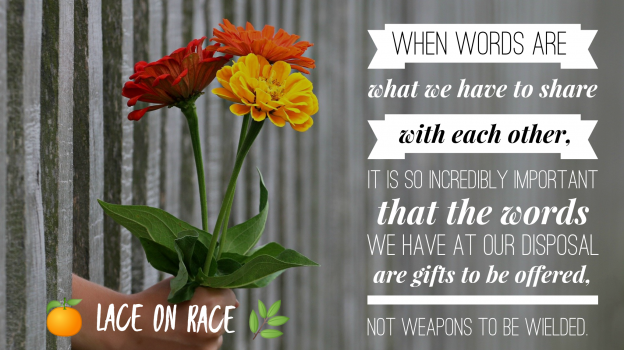BEING THOUGHTFUL ABOUT THE WORDS WE SPEAK:
“There is a great deal of Jewish commentary on speech—about gossip, shaming, lying, and more—and a verse from the biblical book of Proverbs warns, “Death and life are in the power of the tongue.” This may seem hyperbolic, until you consider this quote from Rabbi Abraham Joshua Heschel: “The Holocaust did not begin with the building of crematoria, and Hitler did not come to power with tanks and guns; it all began with uttering evil words, with defamation, with language and propaganda.”
8 NIGHTS, 8 JEWISH VALUES: REFLECTIONS FOR CHANUKAH ON THE JEWISH OBLIGATION TO BUILD A BETTER WORLD’ by Sarah Hurwitz
Much like the other nights, this Seventh Night commentary seems to speak to us very directly.
Here at Lace on Race we are all about words. Words said and unsaid; heard and unheard. We even talk about the white spaces between words. When words are what we have to share with each other, it is so incredibly important that the words we have at our disposal are gifts to be offered, not weapons to be wielded.
We talk about this all the time, because so often, words are, at least, on the surface, undervalued. By now, we all know the lie that is embedded in ‘Sticks and Stones will break my bones, but words will never hurt me’.
By now, we also know how to be mindful and aware of the power dynamic regarding speech; whose words hold the most import; which words can be discarded. We know that words can be both illuminating and obfuscating.
So at this point, we here in this community agree, at least in principle, that thoughtful speech is an imperative.
There is more to it, though.
On this seventh night of Hanukkah, we are joined on the journey by a counselor who has informed my walk for decades, Terry Real. We will be hearing more from Terry next year, but for now, it’s good to note how Terry complements what Sarah Hurwitz is saying here.
Terry Real considers thoughtful speech to be a part of what he calls ‘an ethic of nonviolent living’. This means more than just the words we say out loud or commit to paper or pixels. Terry also includes our thought life. When he speaks of ‘being nonviolent between your ears’ that is stunning.
Rarely do we do deep dives about what is going on within our heads. But our interior life drives our praxis in major ways.
We know how to at least seem to tame the worst impulses of our interior lives. We know when to make our thought lives more palatable to those watching or reading. We’re skilled at it. We almost always employ this skill with superiors and peers. But when we are faced with a person who we consider lesser, our losing strategy of unbridled self expression is given life and power.
So, now we see that it is more, far more, complicated than just being careful about what we speak. We need to careful and discerning about what information we allow into our heads; we need to be careful about the company we keep; we need to be sure we are offering gifts and not wielding weaponry, we need to insure that the words we say are true, necessary, and kind, we need to remember how our words land on others, and we need to, always, remember power and supremacy.
And also this: we need to have a tough talk with the person who influences our choices and our behavior the most: ourselves. Our thought lives can either spiral ever upward, bringing us closer and closer to the people we want to be, or it can enable, even encourage, regress and relapse. If people could read or hear the running commentary in your head, would you be mortified?
So mindful and thoughtful speech includes the unspoken; includes the nonverbal; includes what we say to others, about others, and what we say to ourselves.
Let our lips be always loving and never lashing.
And another Seventh Night ends.

Leave a Reply